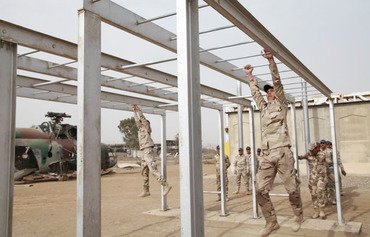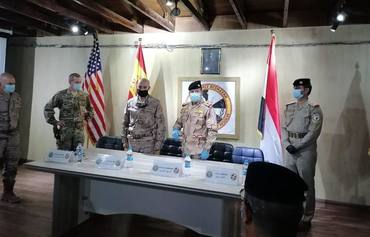With a single bullet, Iraqi soldier Abbas Fadel stopped the progress of a suicide bomber heading towards the base where he is stationed on the outskirts of the city of Mosul.
This incident, along with a string of similar successes in the battle against the "Islamic State of Iraq and the Levant" (ISIL), reflect the improved training, preparedness and determination of the Iraqi forces , officials tell Diyaruna.
Since ISIL overran Mosul and parts of northern Iraq in June 2014, Iraqi forces have been ramping up for the battle to take these areas back, they said, receiving advanced training and equipment from coalition forces.
"I trained well on using my anti-armour launcher and on accurate aiming at the target," said Fadel, who received training from coalition instructors at Basmaya base, south of Baghdad.
"I learned how to use all types of shoulder-launched automatic weapons and how to shoot at both stationary and moving targets," he told Diyaruna.
The combat training he and other soldiers have received has helped them inflict "one loss after another" on ISIL and weaken its ranks, he said.
ISIL fighters "cannot confront us face to face because they know our capabilities, so they try to attack us with car bombs", he said. "But we are on the lookout for them."
Training and equipping soldiers
Coalition members played a key role in training and equipping Iraqi forces, said Ninawa operations commander Lt. Gen. Nejim Eddin Karim al-Jubury.
"They gave us the benefit of their experience," he told Diyaruna. "They trained our soldiers to carry out special combat missions, and contributed to the graduation of a large number of trainers in Basmaya and al-Taji camps."
During their training, Iraqi soldiers learned how to use heavy and medium weapons, he said. They also learned techniques for fighting in complex environments and how to penetrate the enemy's defences, monitor its movements, engage it and accurately address sources of fire.
The training also included "courses in the dismantling of mines, first aid and setting up bridges to facilitate the transit and movement of military vehicles", he said, as well as instruction on protecting civilians in combat areas and releasing hostages and besieged populations.
Guidance on how to engage civilians with professionalism, based on the principles of human rights, was a core component of the training, al-Jubury said.
"In terms of armament, the coalition forces supplied us with weapons, equipment, armoured vehicles, military vehicles, explosives detectors and modern surveillance and monitoring systems," he added.
Coalition efforts produced "a wonderful combat school, represented by the Counter-Terrorism Service (CTS) forces which are today the focus of pride of all Iraqis", said Hashem al-Hashemi, an expert on extremist groups.
"These forces, which include 15 battalions, along with the rapid response forces and special police, received high-quality training and sophisticated armament and were able to achieve quick and clean victories," he told Diyaruna.
They also have won the trust of populations in the liberated areas for their sacrifices, heroism and humanitarian conduct, al-Hashemi said.
Support for Mosul offensive
International forces are providing air cover during the Mosul offensive, al-Jubury said, targeting gatherings of ISIL fighters and responding to their attacks.
"This support is reflected on the ground through the great victories achieved by our troops," he said, noting that CTS forces in eastern Mosul have managed to expel the group from several densely populated neighbourhoods.
The battle to restore Mosul is "difficult, but our troops are able to achieve victory", said CTS deputy commander and Fallujah operations commander Lt. Gen. Abdul Wahab al-Saadi, who led the battle to liberate Fallujah.
"Our fighters are well trained by the international coalition experts and they gained considerable experience through the liberation battles they fought in the cities of Fallujah, Ramadi, Tikrit, Baiji and al-Sharqat," he told Diyaruna.
"Our troops trained to fight in the worst of circumstances and face the enemy with courage," he added.
"We currently are progressing from one neighbourhood to another, and in each one we restore, residents come out to greet us with hugs and praise the humanitarian treatment by our troops and their high professionalism," he said.
Residents of liberated areas south of Mosul "tell us that they now feel safe and can exercise their lives in freedom," said Federal Police headquarters media officer Capt. Mahmoud al-Saadi.
"During the liberation battles, we were committed to providing safe corridors for people," he told Diyaruna.
Emphasis on Iraqi unity
"Any area that we liberate, we aid its people with food and drink, and now our forces share their meals with the residents and provide them with help," al-Saadi said. "No one asks the other about his sect, religion or origin."
Likewise, he added, Iraqi forces come from multiple religious and ethnic groups.
"There are Shia, Sunnis, Kurds and Yazidis," he said. "They are like brothers, and they deal with the liberated residents regardless of their affiliation."
"We are all Iraqis and brought together by one nation that we all defend," he added. "Our enemy is ISIL, and today we stand in one row to expel it from our country."
As part of their emphasis on national unity , al-Saadi said, Federal Police "rebuilt and cleaned churches, including St. Barbara church in the district of Hamdaniya" at the direction of Federal Police commander Lt. Gen. Raed Shaker Jawdat.
"Our engineering teams have contributed to the restoration of roads in southern Mosul to facilitate the movement and transfer of citizens, although this is not our specialty," he said, as part of efforts to assist in any way they can.
Residents of the liberated areas also have been assisting the security forces, he said, providing intelligence about terrorists and people who co-operated with and supported ISIL, including their own relatives, in some cases.
"They also contributed to guiding us to three mass graves of victims executed by ISIL in Hamam al-Alil area shortly before our troops stormed the region," he said, adding that these grave sites are now being exhumed and documented.

![A trainer from the international coalition teaches Iraqi soldiers how to use a rocket launcher. [Photo courtesy of the Iraqi Ministry of Defence]](/cnmi_di/images/2016/12/28/6890-Iraq-training-soldiers-600_384.jpg)







None of the Muslim countries will experience peace and calmness unless those who have commissioned these people as their puppets to create insecurity, reach their intended goals. Because, the claim of these people is in the slogan of the government [unintelligible.] I, however, am certain that the United Sates utilizes Wahhabism as a tool, in order to instigate insecurity in Muslim countries so that it [the United States] can have a presence there one way or another. Afghanistan is an example of this. Initially, there were only a limited number of the Taliban members. Their numbers did not shrink, regardless of the number of the American Forces in Afghanistan. Despite their small quantity, they have made the country extremely unsafe and insecure. The American forces are capable of destroying them; however, should they [the Taliban] ever be destroyed, there will no longer be any reason left for them [the U.S Forces] to remain in Muslim countries.
Reply1 Comment(s)